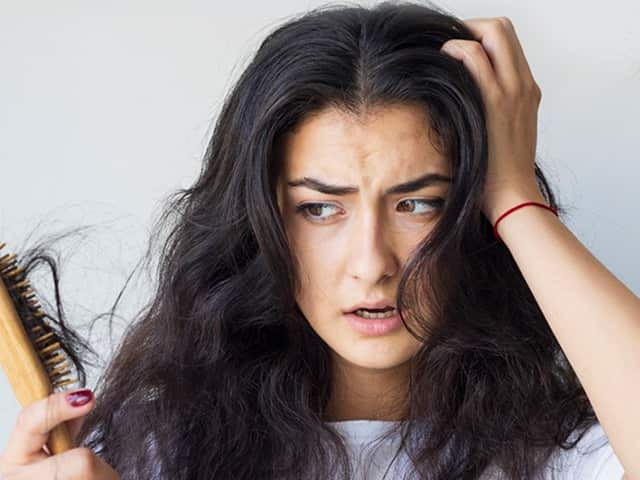Read on we share tips to manage hair fall during the summer.

Sweat in summer can mix with bacteria and oil, creating an environment that might lead to hair fall
Higher temperatures can lead to increased sweating and sebum production on the scalp, potentially clogging hair follicles and causing hair to fall out. Prolonged sun exposure can also damage hair, making it brittle and more prone to breakage. Along with this, humidity can exacerbate scalp conditions like dandruff, which can weaken hair roots. Sweat can mix with bacteria and oil, creating an environment that might lead to hair fall. Managing hair fall in summer requires special attention to both hair care practices and overall health. In this article, we share tips to manage hair fall during the summer.
Tips to help reduce hair fall in summer:
1. Stay hydrated
Hydration keeps the scalp and hair follicles healthy, preventing dryness and brittleness that can lead to hair fall. Drink at least 8-10 glasses of water a day. Include hydrating foods like watermelon, cucumbers, and oranges in your diet.
2. Use a mild shampoo
Mild shampoos cleanse the scalp without stripping it of natural oils, maintaining the health of hair follicles. Choose sulphate-free shampoos with natural ingredients. Wash your hair 2-3 times a week to remove sweat and dirt without over-drying your scalp.
3. Avoid excessive heat styling
Heat styling can damage hair shafts and weaken hair, leading to increased hair fall. Limit the use of hair dryers, straighteners, and curling irons. When necessary, use a heat protectant spray and opt for the lowest heat setting.
4. Protect hair from sun exposure
UV rays can damage hair and scalp, leading to dryness, brittleness, and hair fall. Wear a hat or scarf when outdoors. Use hair products with UV protection, and avoid prolonged sun exposure.
5. Maintain a balanced diet
Proper nutrition ensures that your body has the necessary vitamins and minerals to support healthy hair growth. Include a variety of fruits, vegetables, lean proteins, and healthy fats in your diet. Foods rich in biotin, vitamin E, and omega-3 fatty acids are particularly beneficial for hair health.
6. Use natural hair masks
Natural hair masks can nourish the scalp, strengthen hair shafts, and reduce hair fall. Apply a homemade mask once a week. Ingredients like aloe vera, coconut oil, and yogurt can be mixed and applied to the scalp and hair for 30 minutes before rinsing.
7. Avoid tight hairstyles
Tight hairstyles can pull on hair and damage follicles, leading to traction alopecia and hair fall. Opt for loose hairstyles, and avoid tight ponytails, braids, or buns. Use soft hair ties and avoid styles that put excessive tension on the scalp.
8. Keep the scalp clean and healthy
A clean scalp is less prone to infections and conditions that can lead to hair fall. Regularly cleanse your scalp with a gentle shampoo. Exfoliate occasionally with a scalp scrub to remove dead skin cells and product buildup.
9. Reduce stress
Stress can disrupt the hair growth cycle, leading to increased hair fall. Practice relaxation techniques such as yoga, meditation, and deep breathing exercises. Ensure you get enough sleep and engage in activities that reduce stress.
10. Use a wide-toothed comb
A wide-toothed comb reduces hair breakage and damage compared to fine-toothed combs or brushes. Detangle hair gently using a wide-toothed comb, especially when hair is wet. Start from the ends and work your way up to avoid pulling and breaking hair.
Implementing these tips can significantly reduce hair fall in the summer and promote healthy, strong hair.
Disclaimer: This content including advice provides generic information only. It is in no way a substitute for a qualified medical opinion. Always consult a specialist or your doctor for more information. NDTV does not claim responsibility for this information.
DoctorNDTV is the one stop site for all your health needs providing the most credible health information, health news and tips with expert advice on healthy living, diet plans, informative videos etc. You can get the most relevant and accurate info you need about health problems like diabetes, cancer, pregnancy, HIV and AIDS, weight loss and many other lifestyle diseases. We have a panel of over 350 experts who help us develop content by giving their valuable inputs and bringing to us the latest in the world of healthcare.














